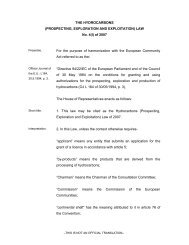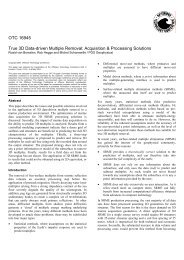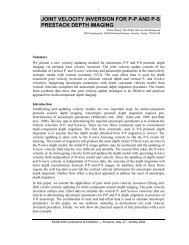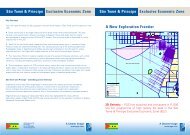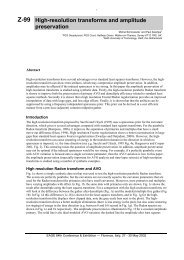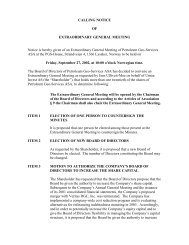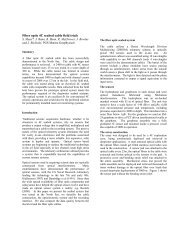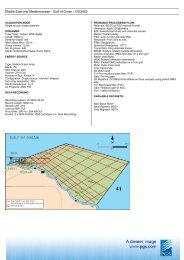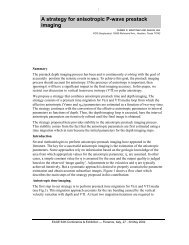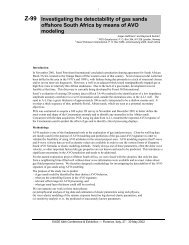Annual Report 2011 - PGS
Annual Report 2011 - PGS
Annual Report 2011 - PGS
Create successful ePaper yourself
Turn your PDF publications into a flip-book with our unique Google optimized e-Paper software.
Notes to the consolidated financial statements<br />
NOTES TO THE CONSOLIDATED FINANCIAL STATEMENTS<br />
Note 3 - Critical Accounting Judgments, Estimates and Assumptions<br />
Critical judgments<br />
The preparation of financial statements in accordance with IFRS requires management to make estimates, assumptions and<br />
judgments that affect the reported amounts of assets and liabilities and the disclosure of contingent liabilities. In many<br />
circumstances, the ultimate outcome related to the estimates, assumptions and judgments may not be known for several years<br />
after the preparation of the financial statements. Actual amounts may differ materially from these estimates due to changes in<br />
general economic conditions, changes in laws and regulations, changes in future operating plans and the inherent imprecision<br />
associated with estimates.<br />
In the process of applying the Company’s accounting policies, which are described above, judgments made by the management<br />
that have the most significant effect on the amounts recognized in the consolidated financial statements are described below.<br />
Estimation uncertainty and assumptions<br />
The key assumptions concerning the future and other key sources of estimation uncertainty at the end of the reporting period<br />
that have a significant risk of causing a material adjustment to the carrying amounts of assets and liabilities within the next<br />
financial year are discussed below.<br />
Deferred tax assets<br />
Deferred tax assets are recognized for all unused tax losses to the extent that it is probable that taxable profit will be available<br />
against which the losses can be utilized. Significant management judgment is required to determine the amount of deferred tax<br />
assets that can be recognized, based upon the likely timing and level of future taxable profits. The estimates of projected future<br />
taxable profits are based on a variety of factors and assumptions, many of which are subjective and are outside of the<br />
Company’s control. Accordingly these estimates could differ significantly from year to year, and the Company might end up<br />
realizing more or less of the deferred tax assets than the Company has recognized in the consolidated statements of financial<br />
position.<br />
Revenue recognition<br />
For multiple-deliverable arrangements and arrangements with other consideration than cash, significant management judgment<br />
may be required in order to allocate the consideration received to separate units of accounting, depending on the available<br />
evidence to support fair value which may include experience with similar transactions, evaluations of expected profit margins,<br />
external appraisals and other evidence as situations warrant.<br />
Amortization of MultiClient library<br />
In determining the annual amortization rates applied to the MultiClient library, management considers expected future sales and<br />
market developments and past experience. These expectations include consideration of geographic location, prospects, political<br />
risk, exploration license periods and general economic conditions. Management updates, at least annually, the total expected<br />
revenue for each survey or group of surveys of the MultiClient library. Because of the inherent difficulty in estimating future sales<br />
and market developments, it is possible that the amortization rates could deviate significantly from year to year. To the extent<br />
that such revenue estimates, or the assumptions used to make those estimates, prove to be higher than actual revenue, the<br />
Company’s future operations will reflect lower profitability due to increased amortization rates applied to the MultiClient library in<br />
later years, and the MultiClient library may also become subject to minimum amortization and/or impairment. The minimum<br />
amortization policy described in significant accounting policies is an additional element of the Company’s MultiClient library<br />
accounting policy in order to reduce the inherent risk in the general amortization policy that is based on the above described<br />
sales forecasting.<br />
Property, equipment and other intangibles<br />
Depreciation and amortization is based on management estimates of the future economic benefits and expected useful lives.<br />
These estimates may change due to changes in market conditions including competition, technological development, use of the<br />
assets and strategic considerations.<br />
Impairment of property, equipment and intangibles<br />
Property, equipment and intangibles (including goodwill) are regularly reviewed for impairment, whenever events or changes in<br />
circumstances indicate that the carrying amount of the asset may not be recoverable. In order to assess if there is any<br />
impairment, estimates are made of the future cash flows expected to result from the use of the asset and its eventual disposal.<br />
Estimating future cash flows requires management to make judgments regarding long-term forecasts of future revenues and<br />
costs related to the assets subject to review. These forecasts are subject to uncertainty as they require assumptions about<br />
demand for our products and services, future market conditions and technological developments. Significant and unanticipated<br />
changes in these assumptions could require a provision for impairment in a future period. Given the nature of these evaluations<br />
and their application to specific assets and specific times, it is not possible to reasonably quantify the impact of changes in these<br />
assumptions.<br />
Income taxes<br />
The Company is subject to income taxes in numerous jurisdictions. Significant judgment is required in determining the<br />
worldwide provision for income taxes. There are many transactions and calculations for which the ultimate tax determination is<br />
uncertain during the ordinary course of business. The Company recognises liabilities for uncertain tax positions based on<br />
estimates of whether additional taxes will be due. Where the final tax outcome of these matters is different from the amounts<br />
<strong>PGS</strong> ANNUAL REPORT <strong>2011</strong> 12<br />
<strong>PGS</strong> <strong>Annual</strong> <strong>Report</strong> <strong>2011</strong> 83



